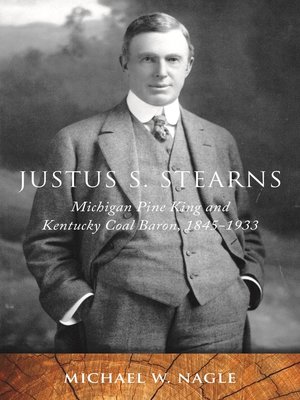Justus S. Stearns
ebook ∣ Michigan Pine King and Kentucky Coal Baron, 1845-1933 · Great Lakes Books
By Michael W. Nagle

Sign up to save your library
With an OverDrive account, you can save your favorite libraries for at-a-glance information about availability. Find out more about OverDrive accounts.
Find this title in Libby, the library reading app by OverDrive.



Search for a digital library with this title
Title found at these libraries:
| Library Name | Distance |
|---|---|
| Loading... |
Examines a major Michigan timber baron and political figure who also founded a coal-mining empire in Kentucky.
Near the turn of the twentieth century, "Pine King" Justus S. Stearns was Michigan's largest producer of manufactured lumber and the owner of a prosperous coal mining operation headquartered in Stearns, Kentucky, a town he founded. Over the course of his career, Stearns would own at least thirty manufacturing businesses—making everything from finished lumber to kitchen utensils, game boards, and motors—as well as hotels, a railroad, and a power company. He was also an active member of the Republican Party who served one term as Michigan's secretary of state and a philanthropist who gave a great deal of his wealth to causes in both Michigan and Kentucky. In Justus S. Stearns: Michigan Pine King and Kentucky Coal Baron, 1845–1933, author Michael W. Nagle details Stearns's astounding range of accomplishments and explores the influence of both paternalism and Social Darwinism in his business practices.
Nagle begins by addressing key events in the first few decades of Stearns's life and his initial foray into the lumber industry. Subsequent chapters explore Stearns's political career, his timber operations in Wisconsin, and his coal, lumber, and railroad operations in Kentucky and Tennessee. Nagle also details the ancillary businesses that Stearns founded or purchased in the early twentieth century, even as his Stearns Salt & Lumber Company served as the anchor of his Michigan holdings, while Stearns Coal & Lumber did the same for his operations in Kentucky. The final chapter offers an overview and analysis of Stearns's lifetime of accomplishments, including his impact on the town of Ludington, Michigan, where he maintained a residence for over fifty years.
Nagle makes extensive use of primary source material from several historical archives as well as contemporary newspaper accounts, court documents, company records, and other primary sources. American history scholars, as well as general readers interested in Michigan's lumbering era and Kentucky's mining history, will enjoy this biography of an exceptionally influential businessman.






